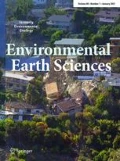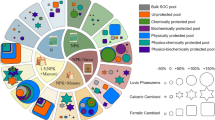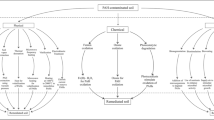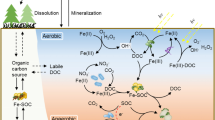Abstract
The aim of this study was to investigate the interactive effects of the concomitant use of petroleum and nitrogen forms on carbon dynamics, and ascertain the effect of the sandy soil characteristics on its process. The experiments were done in the factorial form (3 × 4) and the completely random format path in three continuous times under the laboratory conditions within 126 days of incubation. To meet this purpose, initially, the sandy soil samples were contaminated by the levels of zero, 5, and 10 % of petroleum, and next, they were treated by the nitrogenous salts namely KNO3, NH4Cl, and the mixture of these two salts. The samples were kept in an incubator at 25 ± 1 °C, straight to the completion of the experiments. In the next stage, the treated soil samples were used once in every 7 days for testing the microbial respiration. The results have shown that adding nitrogen into the sandy soil led to the stimulation of soil microbial communities. Simultaneously, adding petroleum and nitrogen, into the soil, had high stimulating effects on the soil carbon mineralization so that the treatment NH4-N and 10 % of petroleum allocated the highest amount of carbon mineralization. In brief, after adding petroleum into the soil, there were some positive and negative interactions between petroleum and the soil microorganism community; however, the application of nitrogen in an appropriate form in soils contaminated with the petroleum may mitigate the detrimental effects of hydrocarbon compounds on the soil microbial community.


Similar content being viewed by others
References
Abioye OP, Agamuthu P, Abdul-Aziz AR (2012) Biodegradation of used motor oil in soil using organic waste amendments. Biotechnol Res Int. doi:10.1155/2012/587041
Adams GO, Tawari-Fufeyin P, Igelenyah E (2014) Bioremediation of spent oil contaminated soils using poultry litter. Res J Eng Appl Sci 3:124–130
Agarry SE, Jimoda LA (2013) Application of carbon-nitrogen supplementation plant and animal sources in in situ soil bioremediation of diesel oil experimental analysis and kinetic modeling. J Environ Earth Sci 3:51–62
Agarry SE, Owabor CN, Yusuf RO (2010a) Studies on biodegradation of kerosene in soil under different bioremediation strategies. Biorem J 14:135–141
Agarry SE, Owabor CN, Yusuf RO (2010b) Bioremediation of soil artificially contaminated with petroleum hydrocarbon mixtures: evaluation of the use of animal manure and chemical fertilizer. Biorem J 14:189–195
Ajwa HA, Tabatabaie MA (1994) Decomposition of different organic materials in soils. Biol Fertil Soils 18:175–182
Akpe AR, Ekundayo AO, Esumeh FI (2014) Screening for crude oil degrading bacteria in liquid organic waste (Effluent samples). Pak J Sci Ind Res 57:86–91
Alexander M (1977) Introduction to soil microbiology, 2nd edn. Kriege Publishing Co., Wiley, New York
Alrumman SA, Standing DB, Paton GI (2014) Effects of hydrocarbon contamination on soil microbial community and enzyme activity. J King Saud Univ Sci 27:31–41
Alwan AH, Fadil SM, Khadair SH, Haloub AA, Mohammed DB, Salah MF, Sabbar SS, Mousa NK, Salah ZA (2013) Bioremediation of the water contaminated by waste of hydrocarbon by use Ceratophyllaceae and Potamogetonaceae plants. J Genet Environ Resour Conserv 1:106–110
Anderson JPE (1982) Soil respiration. In: Page AL, Miller RH (eds) Methods of soil analysis. Part 2, chemical and microbiological properties. American Society of Agronomy, Madison, pp 831–871
Arulazhagan P, Vasudevan N, Yeom IT (2010) Biodegradation of polycyclic aromatic hydrocarbon by a halotolerant bacterial consortium isolated from marine environment. Int J Environ Sci Tech 7:639–652
Asuming-Brempong S, Odei EO (2013) Microbial biomass carbon determination by chloroform fumigation and substrate induced respiration methods. Agric Sci Res J 3:372–378
Bejarano AC, Michel J (2010) Large-scale risk assessment of polycyclic aromatic hydrocarbons in shoreline sediments from Saudi Arabia: environmental legacy after twelve years of the Gulf war oil spill. Environ Pollut 158:1561–1569
Broadbent FE, Norman AG (1947) Some factors affecting the availability of organic nitrogen in soil-a preliminary report. Soil Sci Soc Am Proc 11:264–267
Cappello S, Crisari A, Hassanshahian M, Genovese M, Santisi S, Yakimov MM (2012) Effect of a bioemulsificant exopolysaccharide (EPS2003) on abundance and vitality of marine bacteria. Wat Air Soil Pollut. doi:10.1007/s11270-012-1159-8
Chaineau CH, Rougeux G, Yepremian C, Oudot J (2005) Effect of nutrient concentration on biodegradation of crude oil and associated microbial populations in the soil. Soil Biol Biochem 37:1490–1497
Chen J, Stark JM (2000) Plant species effects and carbon and nitrogen cycling in a sagebrush-crested wheatgrass soil. Soil Biol Biochem 32:47–57
Cheng F, Peng X, Zhao P, Yuan J, Zhong C, Cheng Y, Cui C, Zhang S (2013) Soil microbial biomass basal respiration and enzyme activity of main forest types in Qinling Mountains. doi:10.1371/journalpone.0067353
Chijioke-Osuji CC, Ibegbulam-Njoku PN, Belford EJD (2014) Biodegradation of crude oil polluted soil by composting with agricultural wastes and inorganic fertilizer. J Nat Sci Res 4:28–39
Chorom M, Sharif HS, Mutamedi H (2010) Bioremediation of a crude oil-polluted soil by application of fertilizers. Iran J Environ Health Sci Eng 7:319–326
Coulon F, Whelan MJ, Paton GI, Semple KT, Villa R, Pollard SJT (2010) Multimedia fate of petroleum hydrocarbons in the soil: oil matrix of constructed biopiles. Chemosphere 81:1454–1462
Dadrasnia A, Agamuthu P (2013) Potential biowastes to remediate diesel contaminated soils. Glob NEST J 15:474–484
Ewetola EA (2013) Effect of crude oil pollution on some soil physical properties. J Agric Vet Sci 6:14–17
Fogg K (1988) The effect of added nitrogen on the rate of decomposition of organic matter. Biol Rev 63:433–462
Franco I, Contin M, Bragato G, De Nobili M (2004) Microbiological resilience of soils contaminated with crude oil. Geoderma 121:17–30
Geisseler D, Horwath WR (2008) Regulation of extracellular protease activity in soil in response to different sources and concentrations of nitrogen and carbon. Soil Biol Biochem 40:3040–3048
Geke GW, Bauder JW (1986) Particle size analysis. In: Klute A (ed) Methods of soil analysis. Part 1, Physical and mineralogical methods, 2nd edn. American Society of Agronomy, Madison, pp 383–411
Ghazanshahi G (1997) Soil and plant analysis. Homa Publishing Co., Tehran
Giacometti C, Demyan MS, Cavani L, Marzadori C, Ciavatta C, Kandeler E (2013) Chemical and microbiological soil quality indicators and their potential to differentiate fertilization in temperate agroecosystems. Appl Soil Ecol 64:32–48
Giblin AE, Nadelhoffer KJ, Shaver GR, Laundre JA, McKerrow AJ (1991) Biogeochemical diversity along a riverside toposequence in arctic Alaska. Ecol Monogr 61:415–435
Gomez F, Sartaj M (2014) Optimization of field scale biopiles for bioremediation of petroleum hydrocarbon contaminated soil at low temperature conditions by response surface methodology (RSM). Int Biodeterior Biodegrad 89:103–109
Hart SC, Nason GE, Myrold DD, Perry DA (1994) Dynamics of gross nitrogen transformations in an old-growth forest: the carbon connection. Ecology 75:880–891
Hassanshahian M, Emtiazi G, Cappello S (2012) Isolation and characterization of crude-oildegrading bacteria from the Persian Gulf and the Caspian Sea. Mar Pollut Bull 64:7–12
Hassink J (1995) Organic matter dynamics and N mineralization in grassland soils. Dissertation, Wageningen Agricultural University
Hesnawia RM, Adbeib MM (2013) Effect of nutrient source on indigenous biodegradation of diesel fuel contaminated soil. APCBEE Procedia 5:557–561
Jackson WA, Pardue JH (1999) Potential for enhancement of biodegradation of crude oil in Louisiana salt marshes using nutrient amendments. Water Air Soil Pollut 109:343–355
Jackson LE, Schimel JP, Firestone MK (1989) Short-term partitioning of nitrate and ammonium between plants and microbial biomass in annual grassland. Soil Biol Biochem 21:409–415
Jafari S (2008) Interactions of plant residues and sulfur on microbial and enzymatic activity of a calcareous soil. Dissertation, Shahrekord University
Jafari Haghighi M (2003) Methods of soil analysis, sampling and important hysipcal and chemical analysis with emphasis on theoretical and practical principles. Nedaye Zoha Publishing Co., Tehran
Jenkinson DS, Ladd JN (1981) Microbial biomass in soil: measurement and turnover. In: Paul EA, Ladd JN (eds) Soil biochemistry, vol 5. Dekker, New York, pp 415–471
Jenkinson DS, Powlson DS (1976) The effects of biocidal treatments on metabolism in soil. V. A method for measuring soil biomass. Soil Biol Biochem 8:209–213
Kauppi S, Sinkkonen A, Romantschuk M (2011) Enhancing bioremediation of diesel-fuel-contaminated soil in a boreal climate: comparison of biostimulation and bioaugmentation. Int Biodeterior Biodegrad 65:359–368
Klute A (1986) Methods of Soil Analysis. Part 1, Physical and mineralogical. American Society of Agronomy-Soil Science of America, Madison, pp 413–423
Labud V, Garcia C, Hernandez T (2007) Effect of hydrocarbon pollution on the microbial properties of a sandy and a clay soil. Chemosphere 66:1863–1871
Lexian A (2008) Principles and applications of soil microbiology. Ferdowsi University of Mashhad Press, Mashhad
Malik ZA, Ahmed S (2012) Degradation of petroleum hydrocarbons by oil field isolated bacterial consortium. Afr J Biotechnol 11:650–658
Margesin R, Hammerle M, Tscherko D (2007) Microbial activity and community composition during bioremediation of diesel-oil-contaminated soil: effects of hydrocarbon concentration, fertilizers, and incubation time. Microb Ecol 53:259–269
Martens R (1995) Current methods for measuring microbial biomass C in soil: potentials and limitations. Biol Fertil Soils 19:87–99
Matus FJ (1994) Crop residue decomposition, residual soil organic matter and nitrogen mineralization in arable soils with contrasting textures. Dissertation, Wageningen Agricultural University
McGill WB, Nyborg M (1975) Reclamation of wet forested soils subjected to oil spills, Rept. Contract OSP3-0073 for northern forest research center, Alberta Institute of Pedology, Pub. G-75-1, University of Alberta, Edmonton, Canada
Minaei Tehrani D, Herfatmanesh A (2007) Biodegradation of aliphatic and aromatic fractions of heavy crude oil-contaminated soil: a pilot study. Biorem J 11:71–76
Montagnolli RN, Matos Lopes PR, Bidoia ED (2015) Assessing Bacillus subtilis biosurfactant effects on the biodegradation of petroleum products. Environ Monit Assess 187:4116–4132
Moscatteli C, Di Tizio A, Marinari S, Grego S (2007) Microbial indicators related to soil carbon in Mediterranean land use systems. Soil Till Res 97:51–59
Ndiaye EL, Sandeno JM, McGrath D, Dick RP (2000) Integrative biological indicators for detecting change in soil quality. Am J Altern Agric 15:20–36
Nogales B, Lanfranconi MP, Pina-Villalonga JM, Bosch R (2011) Anthropogenic perturbations in marine microbial communities. FEMS Microbiol Rev 35(2):275–298. doi:10.1111/j.1574-6976.2010.00248.x
Okoh AI (2006) Biodegradation alternative in the cleanup of petroleum hydrocarbon pollutants. Biotechnol Mol Biol Rev 1:38–50
Onuoha SC (2013) Stimulated biodegradation of spent lubricating motor oil in soil amended with animal droppings. J Nat Sci Res 3:106–116
Paul EA, Clark FE (1996) Soil microbiology and biochemistry, 2nd edn. Academic Press, New York
Phulia V, Jamwal A, Saxena N, Chadha NK, Muralidhar AP, Prusty AK (2013) Technologies in aquatic bioremediation. In: Bharti KP, Zaki MSA, Chauhan A (eds) Freshwater ecosystem and xenobiotics. Discovery Publishing House PVT. Ltd., New Delhi, pp 65–91
Pitter P, Chudoba J (1990) Biodegradability of organic substances in the aquatic environment. CRC Press, Boca Raton
Polglase PJ, Attiwill PM, Adams MA (1992) Nitrogen and phosphorus cycling in relation to stand age of Eucalyptus Regnans F. Muell: II. N mineralization and nitrification. Plant Soil 142:167–176
Rahman KSM, Thahira Rahman J, Lakshmanaperumalsamy P, Banat IM (2002) Towards efficient crude oil degradation by a mixed bacterial consortium. Biorem Technol 85:257–261
Raiesi F (2004) Soil properties and N application effects on microbial activities in two winter wheat cropping systems. Biol Fertil Soils 40:88–92
Rivera Espinoza Y, Dendooven L (2004) Dynamics of carbon, nitrogen and hydrocarbons in diesel-contaminated soil amended with biosolids and maize. Chemosphere 54:379–386
Schimel JP, Firestone MK (1989) Inorganic nitrogen incorporation by coniferous forest floor material. Soil Biol Biochem 21:41–46
Schimel JP, Weintraub MN (2003) The implications of exoenzyme activity on microbial carbon and nitrogen limitation in soil: a theoretical model. Soil Biol Biochem 35:549–563
Singh A, Kuhad RC, Ward OP (2009) Advances in applied bioremediation. Soil Biol Ser 17:1–361
Skjemstad JO, Baldock JA (2008) Total and organic carbon. In: Carter MR, Gregorich EG (eds) Soil sampling and methods of analysis, 2nd edn. Taylor and Francis Group, CRC Press, Canadian Society of Soil Science, pp 225–238
Skujins J, McDonald SO (1985) Waste oil biodegradation and changes in microbial populations in a semiarid soil. In: Caldwell DE, Brierley JA, Brieley CL (eds) Planetary ecology. Van Nostrand Reinhold Co, New York, pp 1–549
Spohn M (2015) Microbial respiration per unit microbial biomass depends on litter layer carbon-to-nitrogen ratio. Biogeosciences 12:817–823
Stanford G, Smith SJ (1972) Nitrogen mineralization potential of soils. Soil Sci Soc Am J 36:456–472
Thouand G, Bauda P, Oudot J, Krisch G, Sutton C, Vidalie JF (1999) Laboratory evaluation of crude oil biodegradation with commercial or natural microbial inocula. Can J Microbiol 45:106–115
Van Vuuren MMI, Van der Eerden LJ (1992) Effects of three rates of atmospheric nitrogen deposition enriched with 15N on litter decomposition in a peatland. Soil Biol Biochem 24:527–532
Vance ED, Chapin FS III (2001) Substrate limitations to microbial activity in taiga forest floors. Soil Biol Biochem 33(2):173–188
Waksman SA, Stevens KR (1929) Contribution to the chemical composition of peat: V. The role of microorganisms in peat formation and decomposition. Soil Sci 28:315–340
Acknowledgments
The authors would like to thank University of Malaya (UM) for the financial support through project (Grant PV 096-2011A).
Author information
Authors and Affiliations
Corresponding author
Rights and permissions
About this article
Cite this article
Azari Moghaddam, H., Abu Bakar, N.K. Carbon dynamic in sandy soil artificially contaminated with petroleum in the presence of various forms of inorganic nitrogen for bioremediation. Environ Earth Sci 75, 224 (2016). https://doi.org/10.1007/s12665-015-4927-0
Received:
Accepted:
Published:
DOI: https://doi.org/10.1007/s12665-015-4927-0




